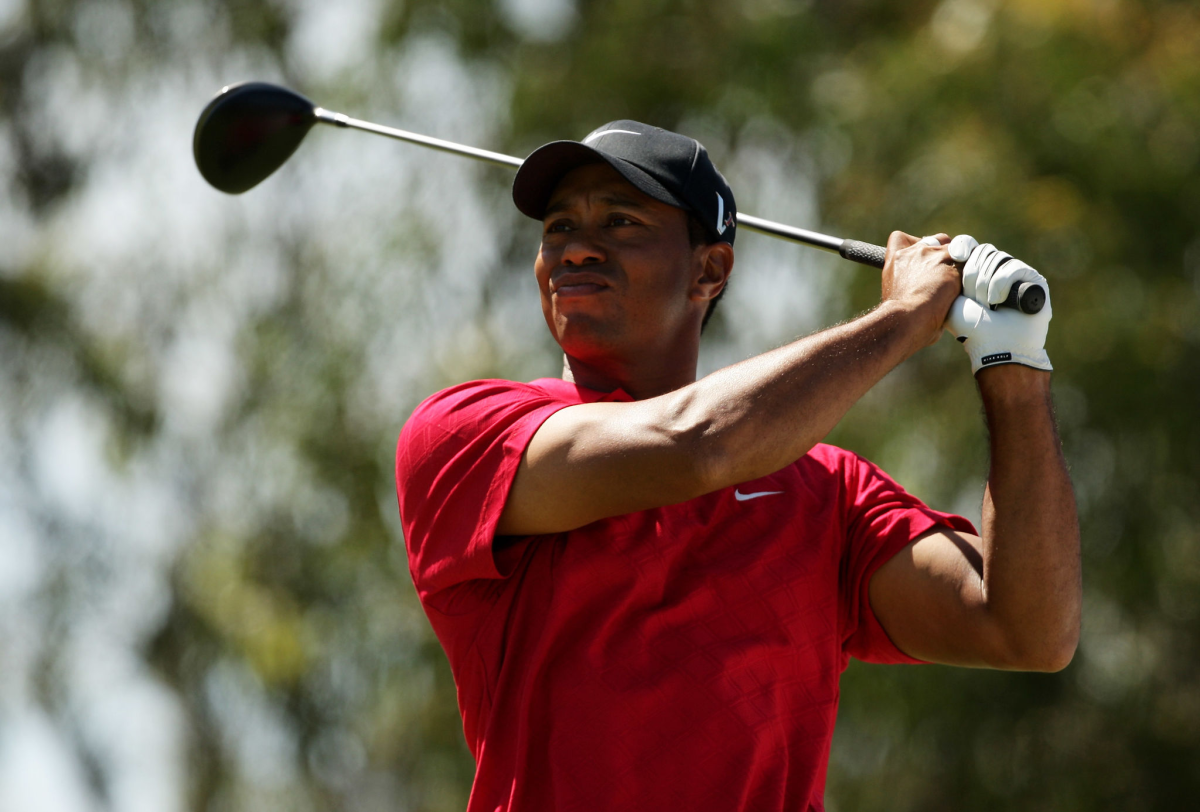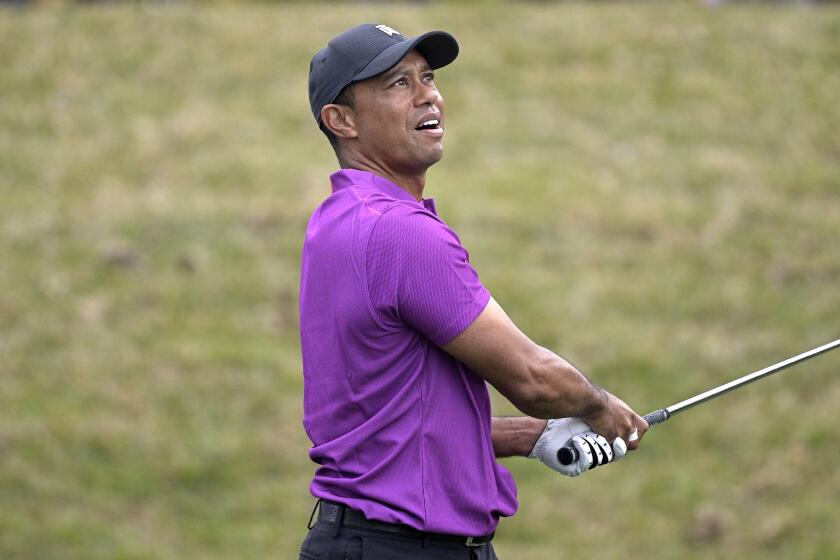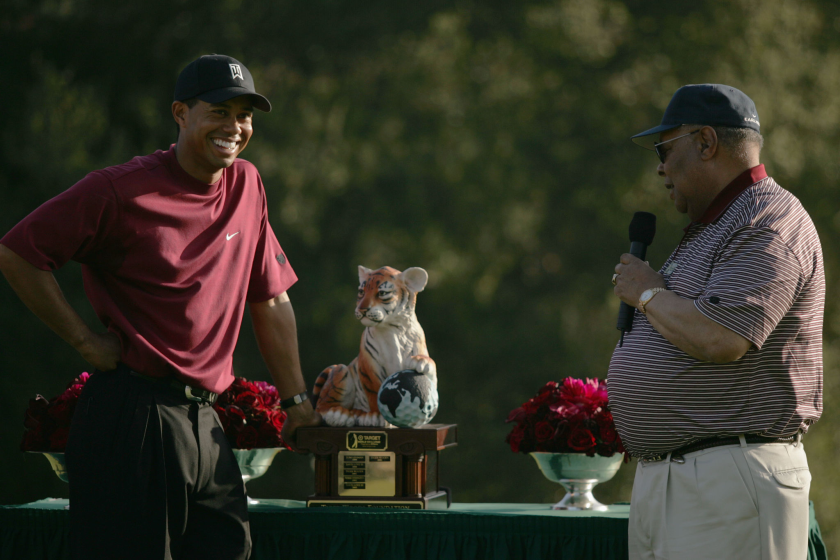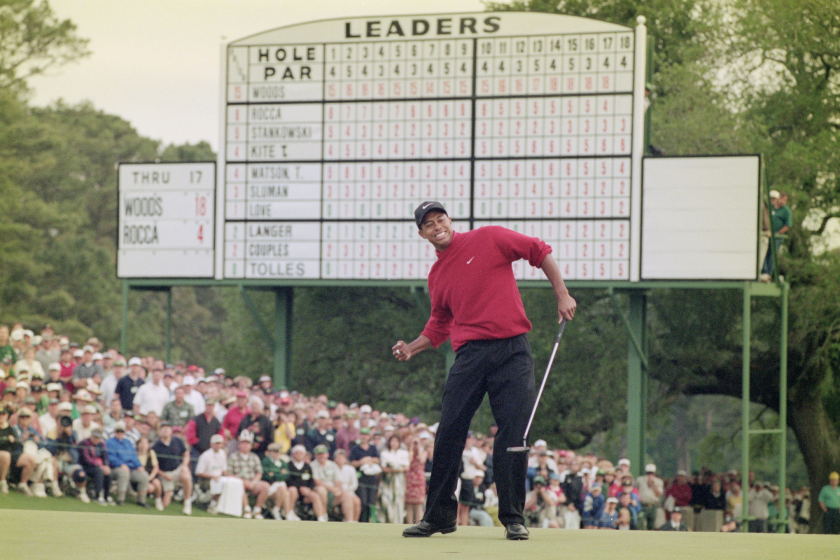‘It started in Vegas’: 15 biggest takeaways from Part 2 of HBO’s documentary, ‘Tiger’

- Share via
The way Rachel Uchitel describes it in the finale of HBO’s two-part “Tiger” documentary, her affair with Tiger Woods at times actually resembled a normal relationship. When they were together, Woods told her he felt like he could get “recharged.” In the mornings, he would eat cereal and watch cartoons. And most of all, he’d always want to talk with her about anything.
“He told me a lot about his childhood, his dad, and that he was sick of trying to hide who he was,” Uchitel said in her first in-depth interview about Woods. “But he was so scared of the real Tiger not living up to the Tiger everybody else thinks he is.”
Of course, the real Tiger was eventually revealed to the world anyway — making for the central subject of Sunday’s episode.
Here are 15 other takeaways from the documentary about golf’s notorious 15-time major champion:
1. There’s a telling moment early in one of the early scenes. Woods is at a charity event, posing with a group of children in front of dozens of cameras. One boy says, “This is weird,” then looks at Woods and asks, “You’re used to this, aren’t you?” Woods, by then a decade into his career, maintained a forced smile while answering: “Oh, you never get used to this.”
Tiger Woods’ life has played out in the public eye, and no matter how hard he tried to control his image, even his darkest secrets could not be hidden.
2. Las Vegas was the breeding ground for some of Woods’ first marital infidelities. He frequented the city often, accompanied by such other superstars as Michael Jordan and Charles Barkley. “In that entourage,” said Tiffany Masters, a former VIP host of Woods’, “Tiger was a bit of a geek.”
According to author Armen Keteyian, Woods asked Jordan how to talk to women when they went to clubs. “Michael, to ever-loving credit, goes, ‘You tell them you’re Tiger Woods,’ ” Keteyian said, adding: “His ability to live a double-life, it started in Vegas.”
3. Woods still maintained the public image of a family man. He and his wife, Elin Nordegren, would sit courtside at basketball games and were profiled in magazines after becoming parents. “I’m happier than I’ve ever been in my life,” Woods said at the time. “I’ve got a wonderful balance between on the golf course and off the golf course.”
4. Woods’ double-life became increasingly difficult to sustain. Two years before his scandal publicly erupted, the National Enquirer almost published a story in 2007 about an affair Woods was having with a Perkins Restaurant waitress named Mindy Lawton.
More than a decade after her involvement with Tiger Woods, Uchitel says employers are still wary of her: “They’ve told me flat out that I’m too scandalous.”
According to former Enquirer editor Neal Boulton, the tabloid had photographers follow Woods and Lawton to their parking lots rendezvous and once “even picked up the tampon Mindy had discarded and kept in their vault as proof.”
The only reason the story didn’t run: Woods’ representatives cut a deal to have the golfer appear on the cover of one of the Enquirer’s sister magazines, Men’s Fitness.
5. During those years, Woods also began training with Navy SEALs at a mountain base outside San Diego. It’s believed Woods was initially drawn there by the memory of his deceased former Green Beret father. But he kept returning over time, participating in mock “kill house” raids, hand-on-hand combat and other military scenarios that left him bruised from “simunition” bullets.
“The SEALs loved to tell stories of just lighting him up,” ESPN writer Wright Thompson said. “The guys in charge were like, ‘You can shoot Tiger wherever you want, just don’t shoot him in his hands.’”
Woods’ former caddie, Steve Williams, recalled Woods once saying, in all seriousness, “I think I’m going to give up golf and go and get in the Navy SEALS.”
HBO’s documentary ‘Tiger’ focuses, often salaciously, on the personal life of Tiger Woods at the expense of his golf career.
6. Golf, however, remained Woods’ primary focus — especially his pursuit of Jack Nicklaus’ record of 18 major championships. “You can finish your career with 19 majors or 100 wins?” ESPN’s Scott Van Pelt once asked Woods. His response: “19.”
Van Pelt countered with another question: “You can finish your career with 17 majors — one fewer than Jack — or 100 wins?” Woods’ answer didn’t change: “19.”
7. Though Woods suffered two lower-leg stress fractures after failing to heed his doctors’ warnings about a knee injury in 2008, he competed in that year’s US Open anyway. As Woods experienced obvious pain the entire time, Williams told him early in the tournament, “Tiger, you might be jeopardizing your career here. Maybe this is a time to quit.”
Woods looked at Williams and answered, “Stevie, f--- you, I’m winning this tournament.” And he did, sinking an iconic putt on the 72nd hole to force a playoff with Rocco Mediate which he won the next day. It was Woods’ 14th major championship. He was only 32 years old.
8. Of all the women involved in Woods’ scandal, Uchitel is perhaps the most well-known. “My name hasn’t lost the stigma at all,” she said. “It’s always been: ‘Rachel Uchitel, Tiger Woods’ mistress.’ ”
In her interview, Uchitel explained she first met Woods at a New York club where she worked. They soon began texting, and a relationship followed. “I remember thinking, with him, ‘How am I ever going to be with a mere mortal ever again?’ ” she said. “So many people put him on a pedestal, and here he was in my bed. He was my Tiger.”
However, he was never only hers, she said: “He told me, ‘You need to learn how to compartmentalize your feelings. Push them off to the side and think about something else.’ ”

9. While Woods was dominating golf in 2009, his secret life was unraveling. When Uchitel joined Woods at that year’s Australian Masters, the National Enquirer was tipped off and, after sending a reporter to confirm their affair, decided to finally run a story.
When Woods returned home, he convinced Nordegren the soon-to-be-published report was false. Uchitel said she even spoke to Nordegren for 30 minutes, promising nothing had transpired between her and Woods. When the story failed to garner much attention, Uchitel was relieved. “We had gotten away unscathed,” she thought.
10. Of course, that wasn’t the case. Two days later on Thanksgiving, Nordegren discovered text messages between Woods and Uchitel. Nordegren even called Uchitel from Woods’ phone. ”I answered saying something like, ‘Hey babe,’ ” Uchitel said. “And, instead of Tiger’s voice, it was Elin.”
Hours later, Woods infamously crashed his car outside his house after fighting with his wife, putting the wheels of his scandal into full motion.
11. Woods’ saga reached every corner of pop culture society, a feeding frenzy for daytime talk shows, late-night television, tabloid covers and paparazzi mobs. Uchitel agreed to a confidentiality agreement with Woods (she reportedly later returned most of the money over legal disputes). Nordegren, meanwhile, moved out of her and Woods’ home.
A friend of Nordegren’s, Sandra Sobieraj Westfall, said that during the move, Nordegren’s and Woods’ daughter, Sam, asked her mom what was wrong. “Elin told her, ‘Mommy’s got a boo-boo,’ ” Westfall recounted. “Sam said, ‘Where? I’ll kiss it and make it feel better.’ And Elin said, ‘It’s in Mommy’s heart.’ ”
12. After the scandal erupted, Woods cut people out of his life. One former friend, Amber Lauria, said he never returned her many offers to help. Williams, his caddy for 13 years and 13 major championships, was fired in 2011 after working for another player while Woods was recovering from an injury. “Tiger was the best man at my wedding,” Williams said. “I didn’t think we’d have no communication for the rest of our lives.”
13. After going winless on the PGA Tour in 2010 and 2011, Tiger followed up a three-win 2012 season with five more victories in 2013, regaining his No. 1 ranking in the world (which spawned a controversial “Winning takes care of everything” Nike ad). But early in 2014, he suffered a back injury at the Honda Classic that eventually required surgery and led to a collapse in his game. It would be more than four years until he won a Tour event again.
‘Tiger,’ premiering Sunday, makes clear that the near-cosmic significance attached to Tiger Woods’ talent was, at least in part, a marketing scheme.
“A lot of times I couldn’t move,” Woods said. “I would have to be helped off the floor, out of the bed, had to be carried around the house. These were tough times, and to live months upon months like that was not fun.”
14. When it happened, many people saw Woods’ DUI arrest in 2017 — and an accompanying mugshot capturing a beaten-down look on his face — as a signal his career was over, that his life was too broken to be put back together again. “He was just a guy in need of a hell of a lot of help,” Keteyian said. “This is the tragic ending no one wants to write.”
15. Woods, of course, did come back, looking increasingly healthy and happy as he returned to full-time competition over the next two years. “The neat thing for me is to be able to share it with my kids,” Woods said. “For so long, all my kids knew was my soreness and pain. They’d never seen me win golf tournaments.”
Woods’ stunning victory at the 2019 Masters — his 15th major championship and first since that 2008 U.S. Open — provided the ultimate moment of redemption. At the start of that week, Woods was asked at a news conference if he felt a “need” to win the tournament again. “Well, I don’t really need to win again,” he said. “But I really want to.” Just the thought of it had made him smile.
More to Read
Go beyond the scoreboard
Get the latest on L.A.'s teams in the daily Sports Report newsletter.
You may occasionally receive promotional content from the Los Angeles Times.















